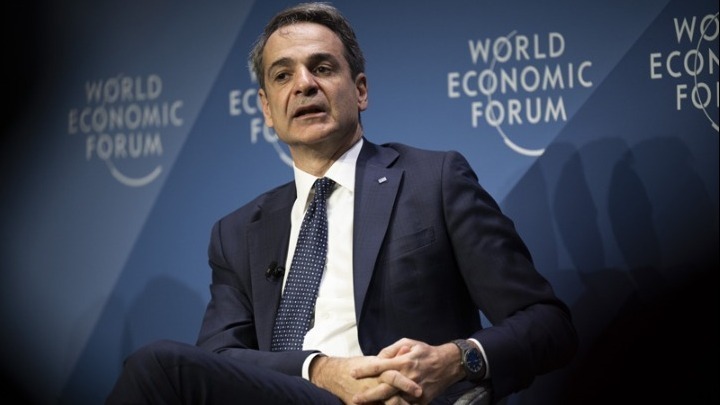“First of all, the fact that we managed to reach an agreement on the conclusions on the migration chapter is a very positive development. And if you allow me to make a more general observation, since 2019 Greece has been supporting a tough but fair migration policy, placing great emphasis on the external dimension of migration, in other words the protection of the external borders of the European Union. And I want to remind you that the problems that Poland is facing today with the instrumentalisation of the migration problem by Belarus and Russia, Greece faced first in March 2020. We show full support to a country that is facing similar problems,” Prime Minister Kyriakos Mitsotakis said in a press conference after the European Council on Thursday.
“Over the intervening years, however, Europe’s policy on migration has changed and has come much closer to the Greek positions. This has now become a self-evident conclusion, which is also evident from the conclusions of the European Council itself. The external dimension of migration, the protection of European borders, the Pact on Immigration and Asylum are Europe’s successes and are positions which are close to the Greek positions. Europe has made a decision. It is a decision which obviously furthers Greek interests, that it is not possible for traffickers to decide who enters the EU. What we are now coming to complete as a next step is to launch a European framework for returns, because our arguments will only be complete if we say that we decide who wants to enter the European Union, but that those who cannot and have no place in Europe because they are not entitled to asylum must return to the country from which they came. And this is precisely the subject of the orders that we have given the European Commission, to quickly develop new European legislation on returns. So I think that Europe is slowly but surely moving in the right direction and in a direction that certainly serves the Greek positions as well.”
The prime minister was asked about the model followed by Italy in creating closed centres in Albania, whether he would be in agreement with such a practice if European legislation were to change and what he proposes to do about it. Mitsotakis replied: “First of all, let us clarify what Italy is and is not doing. Obviously every country has its own peculiarities. It is a new, interesting solution, I would say, and I did not reject it in any way for those cases where migrants are collected in international waters. Greece does not have such issues and their asylum applications will be processed in Italy on the basis of Italian law. However, these people will eventually, in one way or another, pass through Italy again. Let me stress that this is a bilateral agreement between Italy and Albania and is not a decision which at this level has a European dimension. What is of value, and I can say this, is that in Ursula von der Leyen’s letter on returns there is a sentence that we will also look at innovative solutions. And among the innovative solutions that can be considered is this idea of centres outside the European Union to which migrants whose asylum applications are rejected will be sent, if they cannot be returned directly to their countries of origin. This is still an idea; it has not been developed. In principle I find it positive and, obviously, when we see the specific proposals of the European Commission, we will be able to adopt a position.”
Regarding the EU-Turkiye agreement, which called for returns that never actually took place, Mitsotakis said: “It is correct what you point out. I have stressed many times that our cooperation with Turkiye has improved on the level of the refugee-migration issue, but this concerns the operational dimension and better cooperation between the state authorities of Greece and Turkiye, and especially better cooperation with the Coast Guard. But you are right to point out that returns to Turkiye are not taking place whereas they should take place. Obviously, this is an issue that we are concerned about, we are raising it in Turkiye, we are not the only ones raising it, and I think it is an issue that we have to insist on. Greece is carrying out returns, but I want to stress that returns are a difficult process overall, not only for Greece, but for the European Union. Statistically, only one in five of those who have to return to their countries of origin actually do so, and that is why it is so important that Europe and the European Council have now come and acknowledged this problem and are essentially saying – to put it in very simple terms – that if you are not entitled to enter Europe, you must return. This is the only way to send a message to the traffickers and to those that know they are not entitled to asylum. It is an absolutely correct policy, Greece insisted for many years on this dimension which, I emphasise, we are coming to supplement with legal migration agreements, bilateral [agreements] like those Greece is making. But there again, the conditions under which an economic immigrant will come are determined by us and not by the traffickers.”
Asked about his opinion on the creation of closed migrant centres, the prime minister noted: “ As I told you, I am not opposed in principle to any innovative progress and we have to look at [these proposals], we have to think outside the box. We have a problem today, as Europe. We have a problem that we have to deal with and I want to remind you that many of the things we said 4-5 years ago seemed very alien then. When we said in March 2020 that we are temporarily suspending the asylum process because we are accepting a hybrid threat from Turkiye, some people looked at us askance. A lot of rights advocates were saying ‘what are you doing?’ Now that Poland has the same problem, everyone rushes to give support. However, Europe has come closer to [Greece’s] national positions on the migration issue.”
On relations with Turkiye, Mitsotakis said that “today Greece is able to discuss with Turkiye civilly but also from a much stronger position than it was in 2019. Just because we are discussing, however, does not mean that we agree. We are neither selling out nor betraying anyone. The country has paid very dearly in its history for this extreme rhetoric, which ultimately does not serve the national interests and certainly does not bring any substantial alternative to the table. So Greece, and I fully support the Minister of Foreign Affairs in this, will continue to talk with Turkiye, as we have already done. I have met six times with Mr. Erdogan, this does not mean that we have agreed or that we are close to an agreement on the issues of maritime zones, EEZ and continental shelf. We still have a long way to go to get to that point but I wanted to give this slightly more extended answer to all those who think of themselves as being more patriotic than the rest of us.”
SOURCE; ANA-MPA








